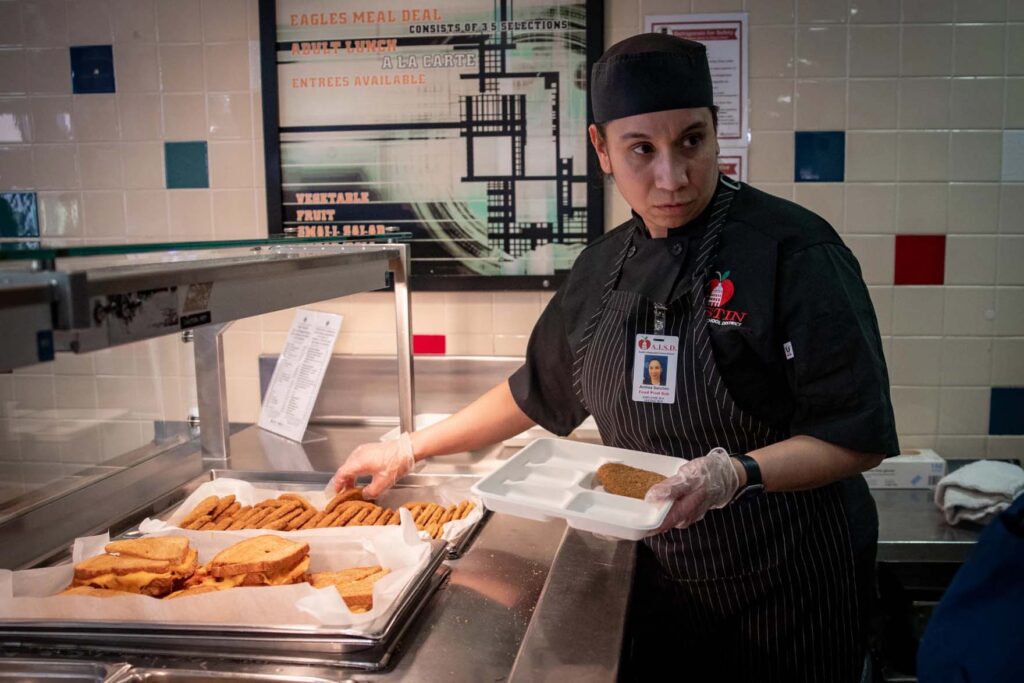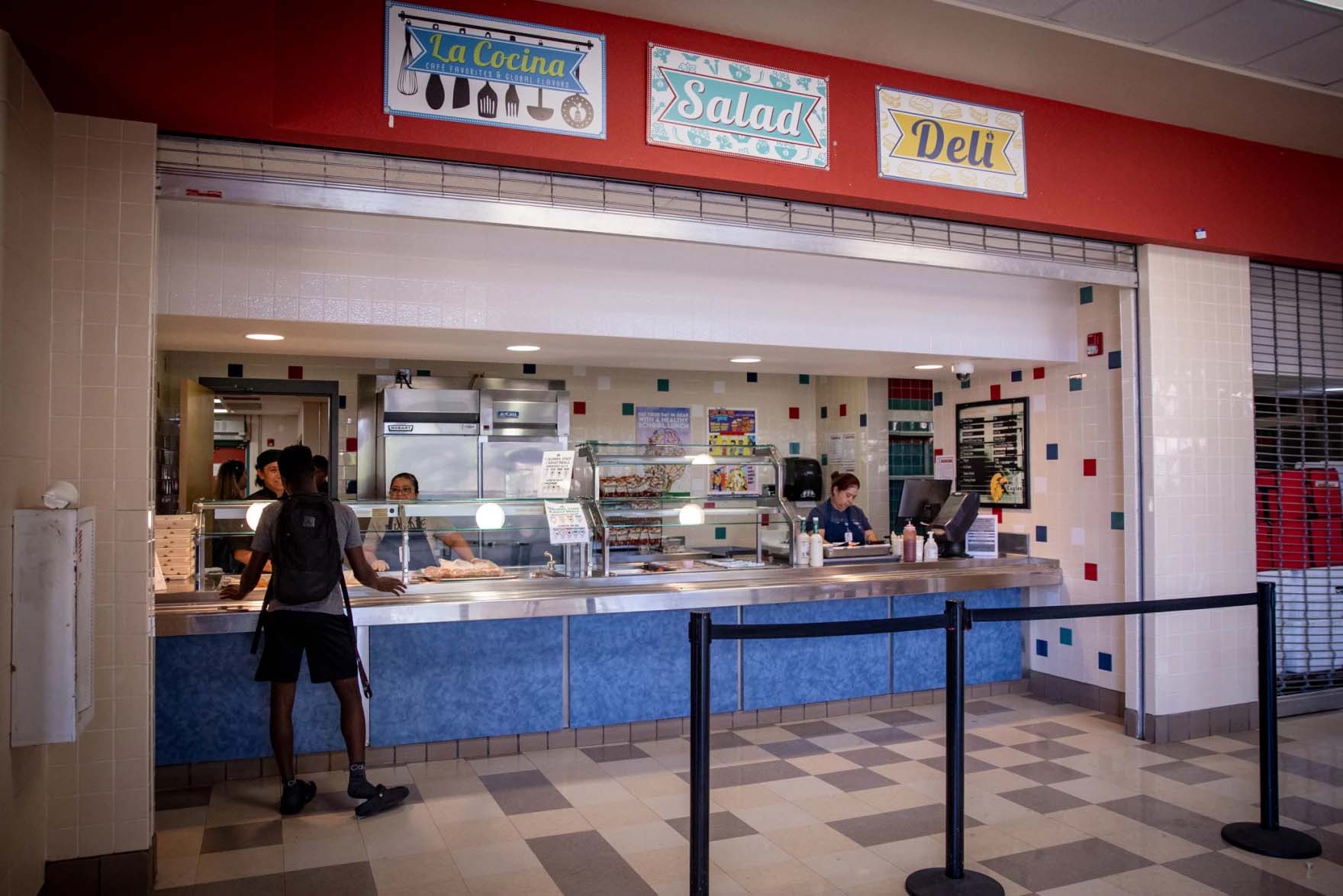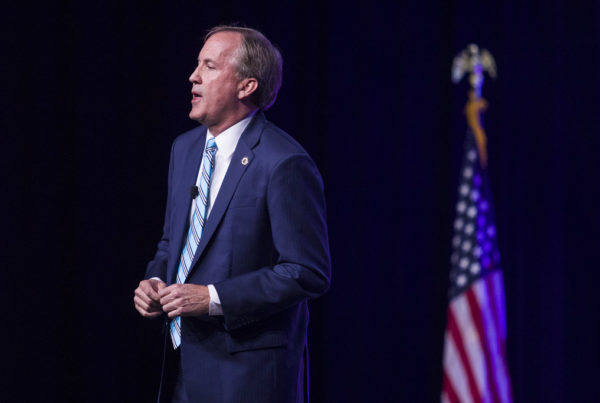From KUT:
On a bright, hot July day, students trickle into the cafeteria at Akins Early College High School in South Austin. There, they can grab chicken, grilled cheese sandwiches, carrots and peas, fresh fruit and a roll for free. They’re greeted by Austin ISD employees, like Roland Cortez.
Cortez, who is the food service manager at Akins ECHS, has been working at the Austin ISD campus for 13 years. He said his team has a primary goal.
“To feed our kids and make them feel welcome, and make them feel like they’re at home,” he said.
Akins ECHS is one of Austin ISD’s summer meal sites, which provide meals to all children for free whether or not they are enrolled in the district.
During the school year, Akins ECHS students also eat breakfast and lunch for free because the school is one of about 70 Austin ISD campuses that is part of the Community Eligibility Provision program. The federal reimbursement program helps cover the cost of meals at campuses that have high populations of students from low-income families.
But more than three dozen Austin ISD schools are not covered by the program. This means students at those campuses who do not qualify for free meals based on family income must pay full price or a reduced price for breakfast and lunch during the school year. Kids in households that earn incomes at or below 130% of the poverty level qualify for free meals. Students in households that earn between 130% and 185% of the federal poverty level can purchase reduced-price meals.
Starting in the upcoming school year, though, students who are eligible for reduced-price meals at all campuses will be able to eat breakfast for free after the Texas Legislature increased funding for school meals.
Ryan Mikolaycik, AISD’s executive director of food service and warehouse operations, said the new funding is going to benefit about 1,800 students in the district.
“This is a historic investment and this is a big win for the families,” he said. “And the bigger win is that this is being supported by the State of Texas.”
The 88th Texas Legislature approved a two-year budget that includes $3.3 million annually to cover the cost of school breakfast for students who qualify for reduced-price meals. The infusion of new dollars means nearly 70,000 students statewide will now eat breakfast for free, according to No Kid Hungry Texas.
While the nonprofit had advocated for Texas lawmakers to cover the cost of both breakfast and lunch for students who qualify for reduced-price meals, Director Stacie Sanchez Hare said allocating state funding for breakfast is an important step.

Andrea Sanchez serves lunch to students at Akins Early College High School.
Renee Dominguez / KUT
“We didn’t get lunch this time, but that’s okay. Now we have something to build upon, and we have champions,” she said. “We’re absolutely thrilled to continue to move in the right direction for Texas kids.”
No Kid Hungry Texas estimates it would have cost the state $31.6 million to pay for breakfast and lunch over the next two years for students who qualify for reduced-price meals. The Legislature had a $33 billion budget surplus this year.
Sanchez Hare hopes Texas will eventually cover the cost of reduced-price lunch, in addition to breakfast. That is also the goal for state Rep. Armando Walle of Houston. He and fellow Democratic state Rep. Toni Rose of Dallas championed school meal funding during the regular legislative session, which ended in May.
“Ultimately, yes, we want to be able to provide free lunch, free breakfast to all children in this state,” Walle said.
Walle said the issue is personal for him. Walle, who is the oldest of five children, grew up with a single mom. He said she worked at Church’s Chicken and sometimes all they had to eat was the food she brought home from work. He said there were times when they didn’t have enough to eat.
“And my family is just one example of hundreds of thousands of families across the state that suffer from child hunger,” he said.
One in five children in the state experience hunger, according to Feeding Texas, a network of food banks.
New funds may help ease school meal debt
The new state funding for school breakfast will help districts that are seeing a rise in student meal debt after federal COVID-19 aid expired.
“There will be fewer children that have to worry about student debt incurred from not being able to pay for their school meals because of this legislation,” said Catherine Wright-Steele, the administrator for food and nutrition at the Texas Department of Agriculture.
Last year, Congress did not extend a pandemic waiver that let schools nationwide provide free meals to students regardless of family income and get reimbursed for all those meals. So, during the 2022-23 school year, districts had to revert to the previous system where meals were either free, reduced-price or full price.
Mikolaycik said the end of that federal pandemic waiver had an impact on Austin ISD. First, fewer students participated in school meal programs because they were no longer free to everyone. He also saw school meal debt increase.
“Now we see a large amount of debt. Luckily we’ve had some friends step in and do some donations,” he said.
A local church donated $24,000 to AISD to help pay off some of that debt. Other school districts in Central Texas, such as Georgetown ISD, have also had donors step up to help pay down school meal debt.
But if school meal debt is not covered by students’ families or donors, districts must pay for the outstanding balances out of their own general fund, which is the same pot of money used for employee salaries. That puts more financial pressure on districts that are already stretching their budgets, like Austin ISD and Pflugerville ISD.
“We saw an astronomical jump in what our school meal debt was this past year as compared to previous years,” PfISD Chief Communications Officer Tamra Spence said.
PfISD typically includes $16,000 in its budget to cover school meal debt. Officials budgeted $32,000 for the 2022-23 school year in the wake of pandemic aid ending, but the district ended the school year with about $124,000 in school meal debt. PfISD is still accepting donations to help reduce that amount before the fiscal year ends in August.
Sanchez Hare said the new state funding for school breakfast may also ease the financial burden educators take on to ensure their students have something to eat.
“We know teachers spend, on average, $300 out of their own pocket every year bringing food into their classroom,” she said.
The benefits of universal free meals
While Texas’ move to pay for breakfast for students who qualify for reduced-price meals will benefit districts’ bottom lines, advocates say — most importantly — it benefits students.
Rachel Cooper is the director of health and food justice at Every Texan, a left-leaning think tank in Austin. She said the federal pandemic waiver that allowed schools to provide universal free meals had positive outcomes for students.
“I think the pandemic showed just how important free meals for all was for families and for schools,” she said. “Schools reported it made just getting the meals out much easier, the process was faster, they saw improvements in children’s academic engagement.”
Cooper said families also appreciated universal free meals because they did not have to worry about filling out an application or making payments, especially in the face of rising food prices. She added meals should be treated like anything else students need to be successful in school.
“Treating meals like we treat books and computers, as just being part of what it takes to have a healthy, active, engaged student,” she said. “The schools provide all of those pieces. That’s what we think we should be doing all the time.”

Students choose from fresh fruit, vegetables and other items for lunch in the Akins Early College High School cafeteria.
Renee Dominguez / KUT
Mikolaycik said he hopes Texas follows in the footsteps of other states that have passed legislation to provide free breakfast and lunch to all students. A handful of states have done this including California, Maine and New Mexico.
Mikolaycik said that he wants students to be able to attend school without them or their families worrying about the cost of breakfast or lunch. He said that he’s seen Austin ISD students reconsider buying food at school because they might not have enough money in their meal account.
“They know,” he said. “They understand. And that is not good to have a child feel that.”















